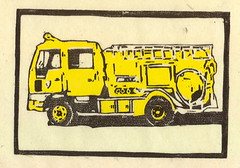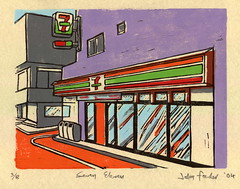Someone asked me about how these prints were made. In fact someone asked me what "lino" is. I wonder if that's a British word? It's short for linoleum, the stuff that people put on their kitchen and bathroom floors... or at least they used to.
The lino used in art for printing is a little different. The traditional lino is a kind of corky, woody brown material, about 3-4mm thick. I remember using it in school. But what I use now (In fact it's the only type I've found here in Japan) is a plastic lino. It cuts very smoothly and of course you can use it many times and wash it without it deteriorating, unlike the tradtional lino. The only disadvantage is that I can only find it in two sizes: postcard and double postcard size. Traditional lino come in a variety of sizes, so you can do large pieces - Picasso did posters using linocut prints.
The cutting part can become very engrossing - a kind of right brian, zen activity - I lose alll track of time and become focussed on cutting.
Some people might regard linocut prints as the poor cousin of the more serious wood cut print , but hey if it was good enough for Picasso it's good enough for me.
Try it yourself.
Saturday, March 12, 2005
Wednesday, March 09, 2005
Fire Engine
This a postcard size lino print I made a couple of months ago. I printed it in a variety of colours.
If you'd like a copy just ask!
If you'd like a copy just ask!
Seven Eleven
This is another lino print. My local Seven Eleven. This is my most ambitious print so far - each colour represents a seperate lino board. I'd had problems with alignment of the different layers before I made a special printing board.
Forest
This is a lino print I did at the end of last year.
The real size of the print is 15x20 cms.
I've been thinking about trying to sell some of my prints.
The real size of the print is 15x20 cms.
I've been thinking about trying to sell some of my prints.
Monday, March 07, 2005
Where's The Map?
If your day job, the one where you turn up at the office in the morning and drag yourself through the day watching the hands of the clock slowly creep towards the hour when you can finally leave, if that job becomes the centre of your life, the main part of your day and of your thoughts, then you are in for a grim and a long trudge. If you don't consider your job to be interesting, compelling or fulfilling, or if it doesn't satisfy you, or if you simply regard it as a necessity for paying the rent, then you had better bloody decide just what exactly does interest, compel, fulfill and satisfy you and then do it.
Life is way too short to waste even a day doing what you don't want to do. Of course sometimes we all have to do things we don't want to do, in fact it happens all the time. There can't be many people in the world who have such wide ranging freedom that they have no obligations or have demands or controls imposed on them.
An obvious example, which people trot out, would be Bill Gates. We all consider Gates to be a very free man, simply because he is very rich, and therefore we assume he can anything he wants. And to a certain extent I guess he can, but he lives in the USA and is bound by the laws of that country and by the rules and laws of business in the USA and the rest of the world.
The other example we would put forward for a person who is free to do anything would be the President of the USA. That position does hold a lot of power but does power necessarily equal freedom?
It's all relative isn't it? The homeless man with nothing in many ways is freer than the salarimen with a job, house, family car etc. I'm pretty sure that if you looked at the suicide figures you would find that most of them are salarimen and not many of them are homeless. I wonder if that's true?
And your point is?
What I'm slowly labouring towards is the thought that you shouldn't consider your day job to be more important than your ultimate goals. For a start you should be clear in your ultimate goals, targets, plans and dreams - you should formulate them, write them down so you know clearly just what it is you are aiming for; just what direction you want to face and move in.
Once you have that clear direction you can then make clear plans on how to both move in that direction and how to reach the goals you have decided on. If these plans are in the same direction as your current day job all well and good, you are a person of clear perception and have made good decisions in the your life that have brought you to an advantageous position.
If, on the other hand you find that your goals and your present position are very different then you have to decide what to do to align your life more in line with your ultimate goals.
You have to remember that your goals are a much clearer representation of the real you than your present day job. Your ultimate goal (and it should not be placed so far into the future as to be meaningless; time waits for no one and nor do birthdays or the continuous rush of passing time), your ultimate goal is the place you want to be and to reach; it means that at some point you will have to stop doing what you are doing now. There will probably be some over lap time when you are doing both, in fact inevitably there will be. And so it follows that you should start doing things to bring you closer to you goal.
What I'm getting at is the fact that at some point, (and it should be early on I think) your goals and plans should take on an importance in your life, daily life and thinking much more important than the day job. The day job is a small element in the bigger picture and landscape. Your goals are the hills and mountains and lakes out there, your present day job and position is merely a stop on the journey, at least it should be. That's why the goals and plans are so important - if you don't have the mountains of your goals to guide you then you will have no direction to follow at all and will probably stay in the boring little muddy village down in the valley.
But seeing the mountain is only half of it, an important half no doubt but only half. The other half is the map and guide to help you reach the mountains. The more detailed the map the clearer will be your direction and you will have more confidence in your journey. If you know where you are ultimately heading it means you can relax a little and enjoy the trip. You can keep your gaze on the peaks and enjoy the landscape you are traveling through. There will no doubt be difficulties and problems: swollen rivers, blisters, rain etc. But if your direction is clear and you map is clear then you simply tackle each problem as it arises, deal with it and then keep moving in the right direction.
But the most important thing, the key point is that you know the direction! Without the direction you are going nowhere. Direction and then a map and then the journey and once you have started walking; once you have made the commitment and started then you can enjoy the challenge and the excitement of the journey and the new sights of the new landscapes that you encounter. If you stay in the shitty little village you maybe be safe and you maybe be warm in your small hut but you will never see the world from the top of the mountains. You will never know the exhilaration of the journey. You will never know just how far you could go, and that would be very sad.
Many people don't realize what they are missing until it is too late. They are working in the village, heads down, feeding the chickens, weeding the fields, peeling potatoes, and then one day they look up and see the snow capped peaks off in the distance, all shimmering and shining in the morning sun and they think that they would like to go up there, perhaps to the top. But they realize it's too late, they are too old, they can't leave the village now, and that knowledge just kills them, sometimes literally.
And you point is?
My point is that the clock is always running. Do not hesitate, be brave, have courage; be true to yourself; do what you know you have to do; you know what it is and what has held you back is the thought... are the thoughts that: you can't do it, I'm not good enough, other people do it much better than I can, I might fail, I'll almost certainly fail, what about the money, what about the family, and many other thoughts which hold you back.
Make you decisions. Set your goals. Make your plans. Make your commitments and get on with it!
Life is way too short to waste even a day doing what you don't want to do. Of course sometimes we all have to do things we don't want to do, in fact it happens all the time. There can't be many people in the world who have such wide ranging freedom that they have no obligations or have demands or controls imposed on them.
An obvious example, which people trot out, would be Bill Gates. We all consider Gates to be a very free man, simply because he is very rich, and therefore we assume he can anything he wants. And to a certain extent I guess he can, but he lives in the USA and is bound by the laws of that country and by the rules and laws of business in the USA and the rest of the world.
The other example we would put forward for a person who is free to do anything would be the President of the USA. That position does hold a lot of power but does power necessarily equal freedom?
It's all relative isn't it? The homeless man with nothing in many ways is freer than the salarimen with a job, house, family car etc. I'm pretty sure that if you looked at the suicide figures you would find that most of them are salarimen and not many of them are homeless. I wonder if that's true?
And your point is?
What I'm slowly labouring towards is the thought that you shouldn't consider your day job to be more important than your ultimate goals. For a start you should be clear in your ultimate goals, targets, plans and dreams - you should formulate them, write them down so you know clearly just what it is you are aiming for; just what direction you want to face and move in.
Once you have that clear direction you can then make clear plans on how to both move in that direction and how to reach the goals you have decided on. If these plans are in the same direction as your current day job all well and good, you are a person of clear perception and have made good decisions in the your life that have brought you to an advantageous position.
If, on the other hand you find that your goals and your present position are very different then you have to decide what to do to align your life more in line with your ultimate goals.
You have to remember that your goals are a much clearer representation of the real you than your present day job. Your ultimate goal (and it should not be placed so far into the future as to be meaningless; time waits for no one and nor do birthdays or the continuous rush of passing time), your ultimate goal is the place you want to be and to reach; it means that at some point you will have to stop doing what you are doing now. There will probably be some over lap time when you are doing both, in fact inevitably there will be. And so it follows that you should start doing things to bring you closer to you goal.
What I'm getting at is the fact that at some point, (and it should be early on I think) your goals and plans should take on an importance in your life, daily life and thinking much more important than the day job. The day job is a small element in the bigger picture and landscape. Your goals are the hills and mountains and lakes out there, your present day job and position is merely a stop on the journey, at least it should be. That's why the goals and plans are so important - if you don't have the mountains of your goals to guide you then you will have no direction to follow at all and will probably stay in the boring little muddy village down in the valley.
But seeing the mountain is only half of it, an important half no doubt but only half. The other half is the map and guide to help you reach the mountains. The more detailed the map the clearer will be your direction and you will have more confidence in your journey. If you know where you are ultimately heading it means you can relax a little and enjoy the trip. You can keep your gaze on the peaks and enjoy the landscape you are traveling through. There will no doubt be difficulties and problems: swollen rivers, blisters, rain etc. But if your direction is clear and you map is clear then you simply tackle each problem as it arises, deal with it and then keep moving in the right direction.
But the most important thing, the key point is that you know the direction! Without the direction you are going nowhere. Direction and then a map and then the journey and once you have started walking; once you have made the commitment and started then you can enjoy the challenge and the excitement of the journey and the new sights of the new landscapes that you encounter. If you stay in the shitty little village you maybe be safe and you maybe be warm in your small hut but you will never see the world from the top of the mountains. You will never know the exhilaration of the journey. You will never know just how far you could go, and that would be very sad.
Many people don't realize what they are missing until it is too late. They are working in the village, heads down, feeding the chickens, weeding the fields, peeling potatoes, and then one day they look up and see the snow capped peaks off in the distance, all shimmering and shining in the morning sun and they think that they would like to go up there, perhaps to the top. But they realize it's too late, they are too old, they can't leave the village now, and that knowledge just kills them, sometimes literally.
And you point is?
My point is that the clock is always running. Do not hesitate, be brave, have courage; be true to yourself; do what you know you have to do; you know what it is and what has held you back is the thought... are the thoughts that: you can't do it, I'm not good enough, other people do it much better than I can, I might fail, I'll almost certainly fail, what about the money, what about the family, and many other thoughts which hold you back.
Make you decisions. Set your goals. Make your plans. Make your commitments and get on with it!
Subscribe to:
Comments (Atom)




